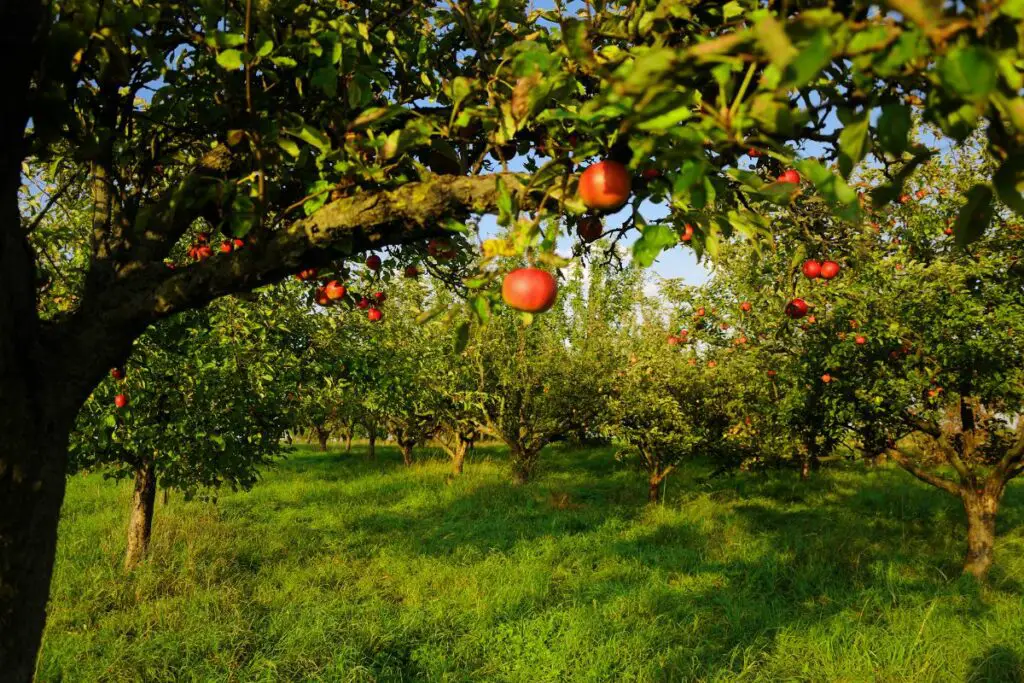
Have you ever wondered how long apple trees live? As a popular fruit-bearing tree, it’s natural to wonder about their lifespan.
Apple trees can live for 30 to 100 years, with some trees living beyond 100 years. The longevity of an apple tree is influenced by many factors, including the rootstock, disease resistance, pruning practices, soil type, and weather conditions.
One of the most critical factors affecting the lifespan of an apple tree is the rootstock. A rootstock is a portion of a plant that is used as the base onto which another plant is grafted. The rootstock can impact the tree’s size, growth rate, and overall lifespan. Dwarf rootstocks, for example, may have a shorter lifespan compared to standard rootstocks.
How Long Do Different Apple Tree Cultivars Live?
Different apple tree cultivars have varying lifespans. Here are some of the most common apple tree cultivars and their average lifespan:
- Golden Delicious: 50 to 80 years
- McIntosh: 45 to 70 years
- Granny Smith: 50 to 80 years
- Honeycrisp: 30 to 50 years
- Red Delicious: 50 to 70 years
- Gala: 35 to 45 years
- Rome: 45 to 70 years
Factors that Affect the Lifespan of Apple Trees
Apple Tree Variety
The variety of apple tree can play a significant role in how long it will live. Some varieties are more prone to disease and pests, while others are hardier and more resistant. For instance, crabapple trees are known for their longevity and can live for up to 100 years, while some dessert apple varieties have a shorter lifespan.
Growing Conditions
Growing conditions can also impact the lifespan of apple trees. They prefer well-draining soil, adequate moisture, and plenty of sunlight. Trees that are planted in poor soil or areas with low rainfall may struggle and have a shorter lifespan. On the other hand, trees that are planted in ideal conditions may live longer.
Care and Maintenance
How well an apple tree is cared for can also affect its lifespan. Proper pruning, fertilizing, and pest management can help trees stay healthy and live longer. Neglecting these tasks can lead to disease, pest infestations, and other issues that can shorten a tree’s lifespan.
Average Lifespan of Apple Trees
As mentioned earlier, the lifespan of apple trees can vary widely depending on several factors. However, here are some general estimates of how long different types of apple trees can live:
Dwarf Apple Trees
Dwarf apple trees are smaller and can be grown in containers or small gardens. They typically have a lifespan of around 15 years, although with proper care, they can live longer.
Semi-Dwarf Apple Trees
Semi-dwarf apple trees are larger than dwarf trees but still smaller than standard apple trees. They have a lifespan of around 20 to 25 years, although some varieties can live for up to 30 years or more.
Standard Apple Trees
Standard apple trees are the largest type of apple tree and can grow up to 30 feet tall. They have a lifespan of around 30 to 50 years, although some varieties can live for up to 100 years.
How to Extend the Lifespan of Your Apple Trees
While some factors that affect the lifespan of apple trees are beyond our control, there are several things you can do to extend the lifespan of your apple trees:
- Choose the right cultivar: Choose apple tree cultivars that are suitable for your location and climate. Consult with your local nursery or agriculture extension service for recommendations.
- Plant in the right location: Plant your apple trees in well-drained soil and in an area that receives adequate sunlight. Avoid planting in areas prone to flooding or where the tree is shaded.
- Provide proper care: Regularly prune your apple trees to remove dead or diseased wood, and provide adequate water and fertilizer. Ensure that the tree is free of pests and diseases.
- Control pests and diseases: Monitor your apple trees for pests and diseases and take appropriate action to control them. This may involve using organic or chemical methods depending on the severity of the infestation.
- Protect the trunk: Protect the base of your apple tree from damage by rodents or lawnmowers. This can be done by using a trunk protector or a ring of wire mesh around the base of the tree.
How to Keep Your Apple Trees Healthy:
To keep your apple trees healthy and productive, you should:
- Choose disease-resistant cultivars.
- Plant apple trees in well-drained soil and in a location with adequate sunlight.
- Water your apple trees regularly, especially during hot and dry weather.
- Fertilize your apple trees with a balanced fertilizer in the spring.
- Prune your apple trees regularly to remove diseased or damaged branches and improve air circulation.
- Monitor your apple trees for pests and diseases and treat them promptly.
- Harvest your apples at the right time to avoid over-ripening and damage.
Conclusion
Apple trees can live for 30 to 100 years, with some trees living beyond 100 years. The lifespan of an apple tree can be impacted by various factors, including the rootstock, disease resistance, pruning practices, soil type, and weather conditions.
By understanding these factors and implementing proper management practices, you can help extend the lifespan of your apple tree. So, if you’re looking to grow apple trees, be sure to select disease-resistant varieties and implement proper pruning techniques to ensure the longevity of your tree.
